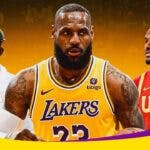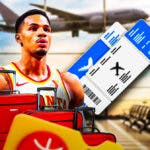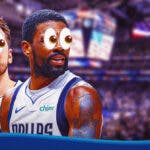When the Cavs dealt Kyrie Irving for Isaiah Thomas, Jae Crowder, Ante Zizic, Brooklyn’s 2018 first-round pick and Miami’s 2020 second round pick, the public response was relatively positive. Sure, they gave up their second best player and one of the best in the league, but they appeared to get plenty in return.
In Thomas, they picked up a guy who averaged 28.9 points and 5.9 assists the year before, and who came fifth in the MVP voting ahead of the likes of Kevin Durant, Steph Curry, Giannis Antetokounmpo and Anthony Davis.
In Crowder, they got a player on a good deal who most rated as a high-quality defender and a contributor on the offensive end. And in the Brooklyn first-rounder, they got what appeared likely to be a top ten pick. Zizic is a potentially capable NBA player, but he and the 2020 pick were essentially fillers.
In other words, the Cavs found a way to keep their team competitive, while also catering for the future. According to Kevin Pelton of ESPN, not only did they minimize the damage from losing Irving, they actually won the trade.

Enter the start of the 2017/18 season. Crowder started to play, and many wondered why he wasn’t reaching the heights many predicted for him. Offensively, he was a shell of his former self. In Boston the year prior, he had averaged 13.9 points, shot 46.3% from the floor and a very respectable 39.8% from downtown. His first two games in Cleveland were serviceable, but after that, he went on a ten game stretch in which he scored in double figures just twice, averaged 6.5 points, shot 35.1% from the floor and 29% from beyond the arc. More alarming still was his defense. Bill Simmons told anyone who would listen that Crowder, while reasonable on defense, was far from the star he was made out to be. He wasn’t the only one to have made these claims, but regardless, the trade appeared to have swung in Boston’s favor with this revelation.
At least the Cavs still had Thomas to come back though, right? Not so much. When he returned, things got much, much worse. Cleveland’s problems have, for a long time, been confined largely to the defensive end, and having a 5”7’ guy at point guard was clearly going to do nothing to help this.  Thomas built his reputation by compensating for his defensive shortcomings on the offensive end, but upon returning from a long-term hip injury, he appeared to have lost this ability. He had lost a step, and when you’re that small that step is so, so important. Drives to the basket were being swatted with complete disdain by anyone in his vicinity, space he was able to create to get off shots last season was notably absent in this one, and he turned it over almost as regularly as he created assists. In a 15 game circus career with the Cavs, he averaged 14.7 points, shot 36.1% from the floor, 25.3% from beyond the arc, and managed 4.5 assists to go alongside 2.7 turnovers. Furthermore, if you believe what you read, he didn’t exactly contribute positively to a detereorating locker room culture in Cleveland.
Thomas built his reputation by compensating for his defensive shortcomings on the offensive end, but upon returning from a long-term hip injury, he appeared to have lost this ability. He had lost a step, and when you’re that small that step is so, so important. Drives to the basket were being swatted with complete disdain by anyone in his vicinity, space he was able to create to get off shots last season was notably absent in this one, and he turned it over almost as regularly as he created assists. In a 15 game circus career with the Cavs, he averaged 14.7 points, shot 36.1% from the floor, 25.3% from beyond the arc, and managed 4.5 assists to go alongside 2.7 turnovers. Furthermore, if you believe what you read, he didn’t exactly contribute positively to a detereorating locker room culture in Cleveland.
So they flipped him, and they flipped Crowder, turning the net outcome of that Irving trade completely on its head. Two hours and 18 minutes before the trade deadline, Thomas was sent packing, traded to the Lakers alongside Channing Frye and Cleveland’s protected 2018 first-round pick for Jordan Clarkson and Larry Nance Jr. Just 28 minutes later, Crowder was gone. As part of a three-team deal involving Sacramento and Utah, the Cavs got rid of Crowder, Iman Shumpert, Derrick Rose, and Miami’s 2020 second-round pick, receiving Rodney Hood and George Hill in return.
Confusing, but what those moves effectively meant was that the net result of the Irving trade was as follows:
Out: Kyrie Irving, Iman Shumpert, Derrick Rose, Channing Frye, 2018 first-round pick
In: George Hill, Rodney Hood, Jordan Clarkson, Larry Nance Jr, Hill, Ante Zizic, Brooklyn’s 2018 first-round pick

In Frye and Shumpert, they traded away two guys whose values had diminished this season; Frye was seeing just 12 minutes game-time a night, while Shumpert only managed to get on the floor 14 times. Rose had only been in Cleveland half a season, but clearly he wasn’t going to help them get where they wanted to go, and the Cavs first-rounder will be significantly closer to 30 than it is to the lottery. So, aside from Irving, they didn’t give up anything major. In the acquisitions, as well as the Brooklyn pick, which is worth plenty, they picked up a bunch of useful role players. More than this though, they picked up players who fill a need, needs which had become glaringly apparent through the first half of the season.
George Hill

In George Hill, they received a player who will be of significantly more use to them than Thomas, even if the former Celtic could significantly improve his play over the course of the rest of the season. Cleveland’s defense concedes 109.7 points per 100 possessions, the third worst in the league. With Thomas on the floor, this ballooned to a woeful 118.6 points. Clearly, this is not entirely attributable to him, but a look at his defense is more than enough to understand why he would make a team worse at this end of the floor. In Hill, they acquired a guy who can defend both guard positions, and who, despite only standing at 6’2”, has a 6’8” wingspan, almost eight inches more than Thomas, allowing him to actually impact his opposition’s play on the perimeter.

The defensive improvements from this end of the trade are clear, but Hill makes more sense than Thomas on offense as well, even if he is a significantly less explosive player. Thomas is a point guard who demands the ball. Unfortunately for him, he is much, much worse than LeBron at running the offense, and while it’s always nice to have a couple of guys who can bring the ball up the floor, it was almost awkward watching Cleveland try to balance their offense between the two. Other than to keep Thomas happy, there wasn’t a whole lot of reason for him to be running the show more than on the occasional possession, and this became increasingly clear the more games he played for Cleveland. Hill, in contrast, is not a ball dominant point guard. He can willingly contribute to ball movement without needing to dominate the ball, a perfect foil for James. Even more importantly, he is a knock down 3-point shooter. He has shot at 40% or higher from downtown for all of his past three seasons, and despite having a completely indifferent season in Sacramento so far, his 45.5% is behind only Joe Ingles and Klay Thompson in 3-point percentage among players who have taken at least 100 shots from beyond the arc this season.

Rodney Hood and Jordan Clarkson
Rodney Hood and Jordan Clarkson will come off the bench, effectively filling the role Rose was intended to fill as a backup guard. Instead, Rose could only get on the court 16 times in Cleveland, and when he did he wasn’t good. He played just 19.3 minutes in these games, averaged 9.8 points, 1.6 assists and 1.8 turnovers. Neither Hood nor Clarkson are extraordinary, but they will achieve a higher ceiling.
Hood is the epitome of a feast or famine player, but when he is hungry he can score big time. Just two games before he was traded to Cleveland, he scored 30 points in 27 minutes off the bench for Utah, shooting a near-perfect 12-14, including 4-4 from 3-point range.  He has averaged 16.8 points per game this season, is shooting 39.6% from beyond the arc, and has scored 25 points or more in eight of the 38 games he has played this season. He can seriously light it up, and is more than capable of leading them to a victory or two in the playoffs.
He has averaged 16.8 points per game this season, is shooting 39.6% from beyond the arc, and has scored 25 points or more in eight of the 38 games he has played this season. He can seriously light it up, and is more than capable of leading them to a victory or two in the playoffs.
Clarkson is not dissimilar, albeit slightly less accomplished. He was averaging 14.5 points in 23.7 minutes off the bench for the Lakers so far this season, and though his four 3-point attempts a night aren’t justified by his 32.4% strike rate and he doesn’t play a whole lot of defense, the man can score. He can get to the hoop, do it on the outside, and set up teammates. He is far from a perfect player, but like Hood he has shown a propensity for big games; just last month, he had back-to-back games which saw him score 33 points (on 14-19 shooting no less) and dish out seven assists before contributing 29 points and ten assists just two days later.

Neither of these two plays great defense, and neither will start, but they will provide a punch off the bench which was absent with the likes of Rose and Wade, and which was also lacking last season, prior to the Irving trade.
Larry Nance Jr

Finally, Nance Jr. The son of former Cleveland star Larry Nance, Nance Jr will not fill the stat sheet, but he is exactly what the Cavs need. A high-energy player, he will bring strong interior defense, plenty of movement, and dunks which are worth more than two points for the energy they will generate. He can play at the five in small ball lineups, and though he is more suited to the four, he provides coach Ty Lue with an ability to get creative, incorporating him into lineups alongside Kevin Love when the all-star returns.
Koby Altman has done well. The Cleveland roster is significantly improved from what it was prior to the trade period, and they have filled needs which were glaringly obvious as the season wore on. Of the four players acquired, essentially for Kyrie Irving, Hill is probably the only one who will start. He will make the Cavs better than Thomas did, but returning to the initial trade, he is clearly a major downgrade on Irving – though at least he won’t iso himself against Klay Thompson before putting up contested 21-footers in the final minutes of tight finals games.
Where the Cavs have actually improved their team as a result of the Irving trade is their bench. With Hood, Clarkson and Nance Jr all able to provide valuable minutes, Cleveland now has significantly more depth than they did last season. Think the finals last year; Deron and Derrick Williams were coming off the bench, as was Richard Jefferson. Sometimes these guys provided decent minutes, particularly Jefferson, but the improvement Cleveland have now made to this part of their roster is significant.

Not only this, but the versatility these players provide gives Tyronn Lue so, so many more options. It’s not inconceivable that more than one of the new acquisition will regularly get fourth-quarter minutes – Hill probably will, Nance Jr certainly could if he is part of a functioning lineup, and Hood will on nights where he turns it on. Clarkson is probably the least likely to be contributing down the stretch, but as he has shown in Los Angeles, he is certainly capable when given the opportunity. Add to that the fact that Kyle Korver is shooting the absolute lights out, and suddenly the Cavs have a very deep, very dangerous roster.

The Brooklyn first-rounder
Of course, the often under-appreciated piece in that Irving trade is the Brooklyn first-rounder.
The Nets have shown some improvement this season but have come to a complete stand-still of late. Their record of 19-39 has them 13th in the east, and they are essentially in a cluster of eight teams between the Kings at 17-38 and the Bulls at 20-36 fighting it out for pole lottery position. Of course, these teams have reason to tank where Brooklyn doesn’t, meaning there’s every chance the Nets end up near the top of this group, but regardless, there is a legitimate chance that this ends up a top-five pick. For a team which needs to perform now in order to give LeBron a reason to stay beyond this season, while also looking to the future in case he leaves, Cleveland has done extremely well to cater for both scenarios.
No team wants to lose great players, and Kyrie Irving is certainly that. Plenty was said about the decision to succumb to his wishes to escape the terrible wrath of LeBron, but the fact is Cleveland did it, and in hindsight were severely underpaid for what they gave up. This trading period though, Koby Altman and his team made the insightful decision to give up on what they had bought, and exchange them for new pieces. The team now looks more well-rounded, more versatile, and in general, better, and the early signs are that these pieces create a much more competent whole than Thomas and Crowder did. Irving is an elite player in the league and will be an all-star for many years to come, but the Cavs, after six months, 54 games, and plenty of disharmonies, finally appear to have received close to adequate compensation. And hey, they still have Ante Zizic.




